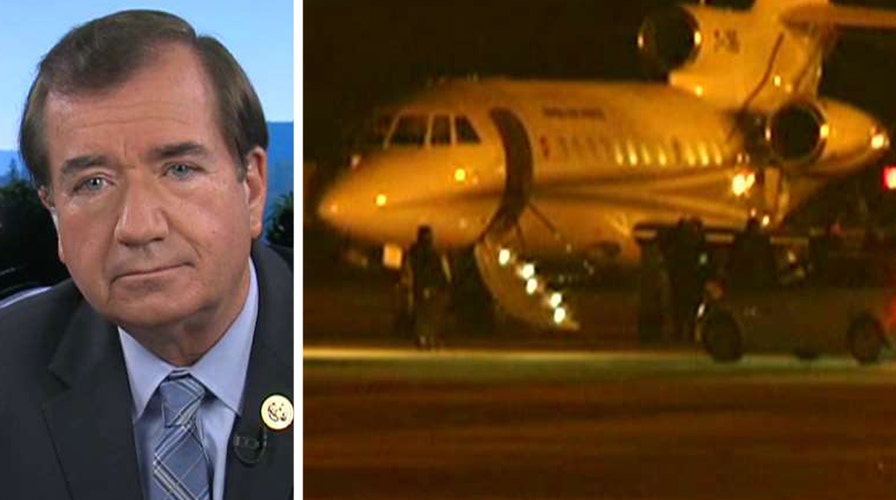Rep. Royce: We did not owe Iran this money
Republican lawmaker sounds off on $400M transaction, says administration wasn't straightforward with Congress
Republicans have a problem with more than just the timing of the Obama administration's controversial $400 million payment to Iran earlier this year -- one top GOP lawmaker says the fact the payment was made in hard currency is another big red flag.
According to House Foreign Affairs Committee Chairman Ed Royce, R-Calif., this could enable Iran to more easily fund groups like Hezbollah since hard cash is the regime's preferred way of financing terrorism.
“If you’re going to have a transaction, the last thing you want to do with Iran … is to give that to them in unmarked bills, in hard currency, in Swiss francs,” Royce told Fox News on Thursday.
The concern adds to the growing complaints on Capitol Hill about the payment, which critics have decried as "ransom" as it coincided with the release of four Americans from Iranian custody.
The Obama administration denies this and insists the payment and the prisoner release were entirely separate.
But no matter the relation between the two, Royce voiced serious doubts Thursday about assurances from the White House that the money would be spent on roads and bridges.
“I can guarantee, the money’s not going for infrastructure … Where do you think the money goes when you give them unmarked bills and they’re the number one sponsor of terrorism in the region?” Royce asked.
“The primary state sponsor of terrorism -- the number one international concern is to not have these kinds of transactions in cash. That’s how they pay Hezbollah. That’s how they pay their fighters,” he added.
The concerns stem from a report in The Wall Street Journal earlier this week that in January the Obama administration secretly airlifted $400 million worth of cash to Iran on the same day the four Americans were released.
The $400 million was the first installment of a $1.7 billion settlement reached with Tehran.
The administration has refused to disclose exactly how the payment was made, but officials told the paper the equivalent of $400 million was transferred to Swiss and Dutch banks and then “converted into other currencies, stacked onto the wooden pallets and sent to Iran on board a cargo plane.”
On Wednesday, the White House conceded it had no means of ensuring the cash was not going into the pockets of terrorists.
Earnest said an analysis done by the administration showed that “largely” the money went to address Iran’s “dire economic condition,” but acknowledged they’ve known all along it could be used for other purposes.
“The U.S. continues to have concerns with some of Iran's nefarious activities," Earnest told reporters.
“The president was quite forward-leaning in advance of the deal being acknowledged that we know that Iran supports terrorism, we know that Iran supports Hezbollah and the Assad regime, and it certainly is possible that some of the money that Iran has is being used for those purposes too,” he said.
State Department Deputy spokesman Mark Toner confirmed on Wednesday the administration looked at options besides paying the Iranians in cash.
He would not offer details, but said “all of the various options were looked at and vetted, and we went with an option that succeeded in getting the Iranians the money that they were owed through the settlement.”
The administration and State Department have denied the payment constituted a quid pro quo or that it was paying a ransom.
Royce had sent Secretary of State John Kerry a letter in February requesting details on the $1.7 billion payment to Iran and answers as to why the administration failed to disclose it to members of Congress when they were briefed on the Iran nuclear deal.
Royce, who has sponsored legislation to prevent the administration from giving Iran access to the U.S. dollar and the U.S. banking system, plans to hold hearings on the payment soon.





